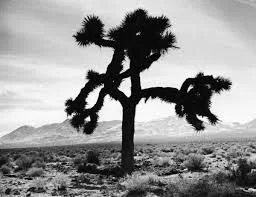The band’s journey into the heart of America, particularly the deserts of California, led to an encounter with the spiky, resilient Joshua tree, which would come to symbolize the album’s themes of survival, spirituality, and stark beauty. Naming the album The Joshua Tree was a decision that emerged organically, as the band absorbed the desolation and wonder of the desert landscape and their own conflicted feelings about America’s promise and peril.
The American Southwest, with its vast, empty deserts, became a powerful source of inspiration for U2 as they were writing and recording the album. Photographer Anton Corbijn, who had a long-standing creative relationship with the band, suggested the idea of photographing U2 in the desert, to visually capture the themes that were swirling around their music.
The American Southwest, with its vast, empty deserts, became a powerful source of inspiration for U2 as they were writing and recording the album. Photographer Anton Corbijn, who had a long-standing creative relationship with the band, suggested the idea of photographing U2 in the desert, to visually capture the themes that were swirling around their music.
Corbijn took the band to the Mojave Desert in California, where they first encountered the Joshua tree, a twisted, otherworldly plant that immediately resonated with the band. The stark isolation of the tree in the barren landscape struck a chord with Bono, who saw it as a symbol of faith and resilience—a visual metaphor for the album’s explorations of both spiritual and political survival.
The iconic album cover, shot by Corbijn, features U2 standing in this empty, vast landscape with the Joshua tree looming large, cementing the connection between the music and the environment that inspired it.
The decision to name the album The Joshua Tree didn’t happen right away.
The decision to name the album The Joshua Tree didn’t happen right away.
In fact, U2 went through a period of uncertainty about what to call the record. Bono had been drawn to the American West during the band’s U.S. tour and became increasingly fixated on the desert as a symbol of both beauty and desolation. He saw the desert as a place of spiritual searching—a place where one could confront isolation and wrestle with faith.
The band toyed with various album titles, but none captured the essence of what they were trying to say in the way that the Joshua tree did. When Bono learned that early Mormon settlers had named the Joshua tree after the biblical figure Joshua, who led his people to the promised land, the symbolism clicked. The tree’s ability to survive in harsh conditions, standing alone and resilient, mirrored the album’s themes of faith, hope, and struggle.
The album’s spiritual undertones were central to this decision. U2 had always been a band that grappled with faith, and The Joshua Tree was no different. Bono, in particular, was exploring his own spiritual questions—longing for meaning in an increasingly fractured world.
The album’s spiritual undertones were central to this decision. U2 had always been a band that grappled with faith, and The Joshua Tree was no different. Bono, in particular, was exploring his own spiritual questions—longing for meaning in an increasingly fractured world.
The Joshua tree, with its rugged defiance in a harsh landscape, became a fitting metaphor for this quest.
Tracks like “I Still Haven’t Found What I’m Looking For” and “Where the Streets Have No Name” reflect this search for spiritual and personal redemption. The tree became a symbol not just of survival, but of the desire for something greater, something transcendent. As Bono himself said, the desert is “vast and immovable,” and so were the questions of faith and purpose that haunted him during the making of the album.
The Joshua Tree is also a scathing critique of U.S. politics and foreign policy in the 1980s. The band had spent time in Central America during this period and witnessed the human rights abuses and devastation caused by U.S. intervention in countries like Nicaragua and El Salvador.
Songs like “Bullet the Blue Sky” and “Mothers of the Disappeared” reflect U2’s deep unease with the darker side of America’s global influence. In this sense, the Joshua tree also symbolized the paradox of America itself: a land of freedom and beauty, but also of violence and oppression.
The tree, standing solitary in a barren land, became a metaphor for the contradictions U2 saw in the American Dream.
In the end, naming the album The Joshua Tree gave U2’s sprawling and ambitious work a unifying symbol. It encapsulated the album’s complex themes—faith and doubt, hope and despair, admiration and critique. Corbijn’s stark black-and-white photographs of the band standing beside a lone Joshua tree only deepened the connection between the music and the landscape that inspired it.
In the end, naming the album The Joshua Tree gave U2’s sprawling and ambitious work a unifying symbol. It encapsulated the album’s complex themes—faith and doubt, hope and despair, admiration and critique. Corbijn’s stark black-and-white photographs of the band standing beside a lone Joshua tree only deepened the connection between the music and the landscape that inspired it.
The decision to name the album after this resilient desert plant was the final touch that tied together the record’s sweeping vision. Just like the tree itself, the album endures, standing as a testament to U2’s ability to navigate and reflect the complexities of both the personal and the political, finding beauty in the harshest of places.


0 Achtung Babies:
Post a Comment